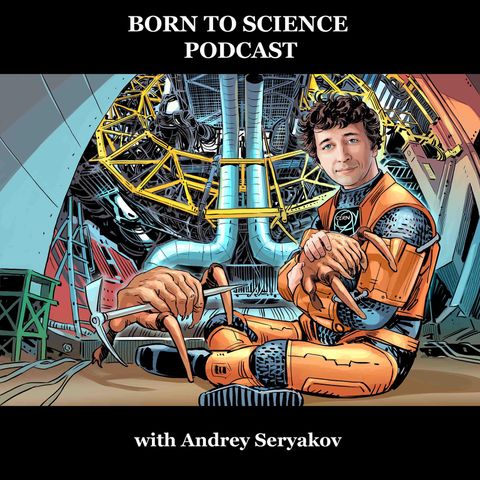2. Relativistic heavy ion collisions and quark-gluon plasma - Boris Tomasik

Apr 8, 2019 ·
1h 17m 31s
Can you imagine how the matter behaved right after the Big Bang? Consider two atomic nuclei flying toward each other with almost speed of light. What happens if they collide?...
show more
Can you imagine how the matter behaved right after the Big Bang?
Consider two atomic nuclei flying toward each other with almost speed of light. What happens if they collide? We create a tiny unstable droplet of the primordial matter.
This matter has nothing in common with the ordinary matter which surrounds us. It is much denser and extremely hot (temperature > 1 000 000 000 000 000 C). The field researching that is called the heavy ion collisions physics, and the matter is called quark-gluon plasma.
This is the second and the last pilot episode of the Born to science podcast and today’s guest is a professor Boris Tomasik. He develops the theory of heavy ion collisions in the Czech Technical University in Prague and the Matej Bel University in Slovakia. We will discuss what quark-gluon plasma is, how we create it and how it behaves. Enjoy!
This episode was supported by the COST-THOR EU programme.
p.s. This is the last pilot episode of the podcast. So I would appreciate any feedback from your side. Comments and suggestions are very welcome. If you like it and want more, then text me about it and don't forget to share the podcast with your friends
you can find me on fb: https://www.facebook.com/BornToScience/
and vk: https://vk.com/born_to_science
show less
Consider two atomic nuclei flying toward each other with almost speed of light. What happens if they collide? We create a tiny unstable droplet of the primordial matter.
This matter has nothing in common with the ordinary matter which surrounds us. It is much denser and extremely hot (temperature > 1 000 000 000 000 000 C). The field researching that is called the heavy ion collisions physics, and the matter is called quark-gluon plasma.
This is the second and the last pilot episode of the Born to science podcast and today’s guest is a professor Boris Tomasik. He develops the theory of heavy ion collisions in the Czech Technical University in Prague and the Matej Bel University in Slovakia. We will discuss what quark-gluon plasma is, how we create it and how it behaves. Enjoy!
This episode was supported by the COST-THOR EU programme.
p.s. This is the last pilot episode of the podcast. So I would appreciate any feedback from your side. Comments and suggestions are very welcome. If you like it and want more, then text me about it and don't forget to share the podcast with your friends
you can find me on fb: https://www.facebook.com/BornToScience/
and vk: https://vk.com/born_to_science
Information
| Author | Andrey Seryakov |
| Website | - |
| Tags |
Copyright 2024 - Spreaker Inc. an iHeartMedia Company
